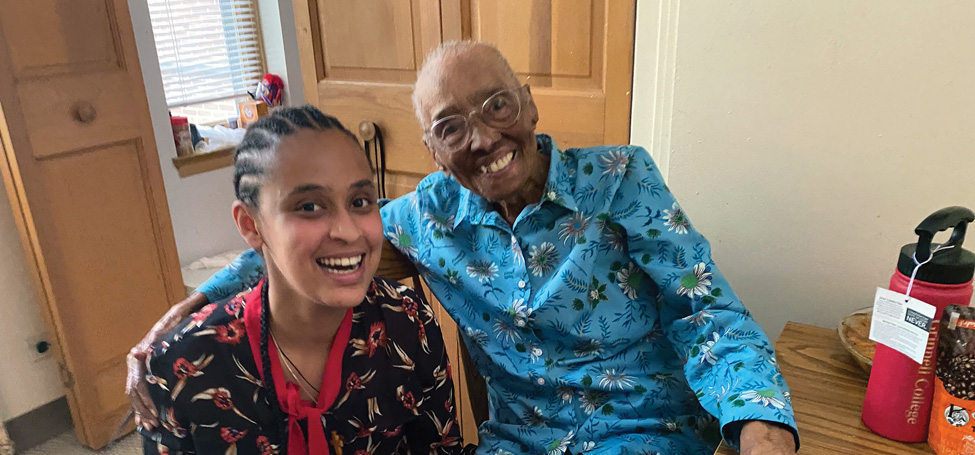
When a Name Becomes a Person
After the protracted process of attaining a visa and an itinerary amid the pandemic, I arrived on campus in early 2021. At the end of the school year, I was concerned about leaving the United States for the summer and asked my academic adviser, Tamara Beauboeuf-Lafontant, about research opportunities. “Dr. B,” as she is called, was interested in the undergraduate experiences of Edith Renfrow Smith, Grinnell’s first Black woman graduate and at 107 the College’s oldest living alumnus. She asked me if I’d like to work with her. I said yes.
This was my first time doing archival research. To gather biographical information about Smith, I examined transcripts of previous interviews Smith had given, a thin archival folder labeled with her name, and old Grinnell College catalogs and yearbooks.
Edith Renfrow Smith was born in Grinnell, Iowa, on July 14, 1914. Her grandparents were born into slavery, and her parents were among the early African Americans who made Grinnell their home. She was the fifth of six children and the youngest of the four girls.
She studied in Grinnell all her life; she attended the local grade schools before enrolling in Grinnell College in 1933. As an undergraduate, she majored in psychology and minored in history and economics. She also participated in many sports including field hockey, basketball, and tennikoit, a form of ring tennis.
After graduating from Grinnell College, she worked in Chicago at the YWCA and eventually became a public school teacher.
My research also included the history of Grinnell, both the College and the town, and the role African Americans have played in it. Although the town touts its abolitionist roots, including being a stop on the underground railroad, the experiences of most Black residents have often been difficult. After high school, most Blacks — including Smith’s siblings — left for better job and social opportunities.
In all this material, what has intrigued me is her persistent loyalty to and ceaseless love for Grinnell, the town and the College. I began to comprehend what makes Grinnell special for her when Dr. B. and I had the honor of visiting Smith at her home in the Bethany Retirement Community in Chicago in June 2021.
As we walked into her apartment, Smith greeted us warmly. She was wearing a sky-blue blouse with yellow butterflies and cream-colored slacks. One of the first comments Smith made to us was: “Grinnell was home.” This statement was a simple one yet carried profound and dense meaning. I’ve come to realize that Grinnell was home to her because of the memories she cherished and the connections she forged.
Smith grew up seeing her mother host weekend meals for the few Black male Grinnellians who studied on campus in the 1920s. As a high school student, she attended concerts at the College and she was part of the Campfire Girls, a group led by Laetitia Conard, a member of the College’s faculty. When she was in college, the education department chair, Milton Wittler, and his wife kept a room for her at their house so that she would not have to walk two miles back home during the winter.
She calls Grinnell a “wonderful place.” Since graduating, she has visited Grinnell regularly. She chooses to call the town home despite not being allowed to get a proper seat at the movies for years. She chooses to praise the College despite having been the only Black student on campus during her four years. Loving Grinnell, the town and the College, was a choice she made, regardless of the treatment she and her family received.
Smith developed such a mentality largely due to her mother, Eva Craig Renfrow. She grew up hearing her mom say, “No one is better than you.” She recalls, “My mama told me you may not have many clothes, you may not be pretty, but you got it up here. If you have it up here, nobody can take it away.” Indeed, all the Renfrow children completed college.
As Smith continued to share these stories, I reflected on my own upbringing in Ethiopia. Neither of my parents had the opportunity to attend college. My mother helped me with my homework until all my textbooks were written in English, a language she can’t speak.
I still remember the day I came home with a math word problem in English. Terrified of going to school with incomplete homework, I stayed up late trying to solve the problem myself while my mother patiently sat next to me. She brought me a blanket and warm milk, and she told me, “Whether you get the answer or not, don’t lose faith in yourself.”
At the end of my summer research, Edith Renfrow Smith is more than just a name I recall. She embodies the Grinnellian I aspire to be: compassionate, kind, humble, self-confident, dedicated, and inspiring.
